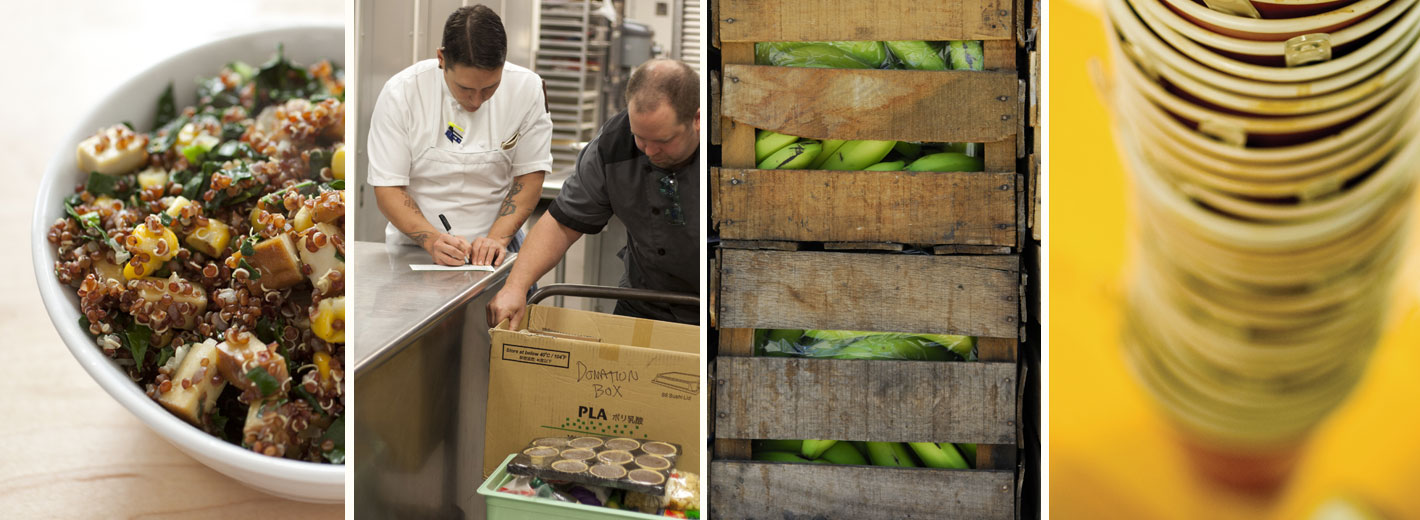
Bon Appétit Reports Progress Toward Low Carbon Lifestyle Goals
Food service pioneer — the first restaurant company to connect food to climate change — shares report card on its 2015 commitments to plant-based proteins, decreasing deforestation, trimming transportation emissions, and reducing food waste
March 25, 2019 (Palo Alto, CA) — For over a decade, Bon Appétit Management Company has been concerned about climate change and how the food system is contributing to our increasingly perilous future via the types of food we choose; the ways that food is produced, packaged, and transported; and the amounts wasted or lost. To begin decreasing our company’s impact, we launched our Low Carbon Diet in 2007, then updated it as the Low Carbon Lifestyle in 2015 with new commitments in four areas: beefing up plant-based proteins, reducing food waste, trimming transportation emissions, and decreasing deforestation.
Here’s where we stand on our progress toward those goals:
PRIORITIZING PLANT-BASED PROTEINS
COMMITMENT: Bon Appétit committed to continuing to shift the proteins we serve from animal- to plant-based sources. We set an aggressive target of an average of less than 1 ounce-per-guest-per-meal for beef and less than 3.5 ounces for all meat, poultry, and seafood. We offered training to our chefs on moving their menus away from beef and cheese, offering specifically defined reasonable portions of any animal protein (less than or equal to those of the U.S. Dietary Guidelines), and techniques to emphasize plant-based proteins. We launched detailed reporting on this and other metrics, via our custom, in-house-created Food Standards Dashboard tool.
STATUS: Complete. We successfully met this goal. During our fiscal year 2018, our teams purchased an average of 0.67 ounces of beef per guest per meal companywide and 3.42 ounces for all meat, poultry, and seafood.
DECREASING DEFORESTATION
 COMMITMENT: In 2015 we vowed to support sustainable forestry and agricultural management through our purchasing practices, including continuing the Low Carbon Diet commitments to purchasing meat from North American farms and ranches, opting for paper products that are FSC Certified and/or made from recycled content, and setting measurable goals for the purchase of ethically aligned coffee that helps conserve forests globally.
COMMITMENT: In 2015 we vowed to support sustainable forestry and agricultural management through our purchasing practices, including continuing the Low Carbon Diet commitments to purchasing meat from North American farms and ranches, opting for paper products that are FSC Certified and/or made from recycled content, and setting measurable goals for the purchase of ethically aligned coffee that helps conserve forests globally.
STATUS: Partially complete.
Meat: Complete. We continued to purchase only meat from North American farms and/or ranches.
Paper products: Partially complete. This area turned out to be surprisingly complex. As of the first quarter of fiscal year 2019, we have the following rates of success of switching to either FSC Certified and/or made from recycled content for the following materials.
- Marketing materials: 100% success
- Office paper: 96.6% success
- Paper towels: 80.8% success
- Napkins: 90.9% success
Paper towels presented an unexpected challenge because, as we found out, there are many types of paper towel dispensers in use in our kitchens and cafés — and most require a specific size/type of paper towel. Even within the same brand, there are varied dispensers, and paper towels are not interchangeable between them. We are now moving toward a “universal dispenser.” Additionally, since we are a geographically dispersed company, we struggle to meet stocking minimums for specific paper towel products in our regional distribution houses. With napkins, we encountered some resistance from clients who were attached to a certain kind of napkin, and also because certain types of napkins (branded with company/university colors) are often requested for catering events.
Coffee: Complete. We have made a new commitment through the Sustainable Coffee Challenge, collaborative effort of companies, governments, NGOs, research institutions, and others to transition the coffee sector to be fully sustainable. We pledged that by the end of 2021, all of our coffee purchases will come either from a third-party certified/verified source or from a vendor enrolled in Farm to Fork, our local sourcing program. Accepted standards are Fair Trade, Certified Organic, Rainforest Alliance, Bird Friendly, and Coffee and Farmer Equity [CAFE] Standards. Over that time, we will also engage with our Farm to Fork coffee roasters to better understand their supply chains and sourcing practices, and to use that information to evaluate and update current requirements for Farm to Fork coffee roasters. (Our coffee commitment is about more than climate change; see “Bon Appétit Joins Sustainable Coffee Challenge with Dual Global/Local Sourcing Commitment.”)
TRIMMING TRANSPORTATION
 COMMITMENT: We were already considering both the distance food traveled and, more critically, the mode of transportation when making purchasing decisions in order to prioritize carbon-efficient transportation of food. For the 2007 Low Carbon Diet, we had committed to avoiding air-freighted seafood; restricting purchases of vegetables, meat, non-tropical fruit, and bottled water purchases to North America; encouraging purchases of seasonal and regional fruits; and training chefs and managers how to prioritize tropical fruit that is typically boated or trucked versus air-freighted when needed.
COMMITMENT: We were already considering both the distance food traveled and, more critically, the mode of transportation when making purchasing decisions in order to prioritize carbon-efficient transportation of food. For the 2007 Low Carbon Diet, we had committed to avoiding air-freighted seafood; restricting purchases of vegetables, meat, non-tropical fruit, and bottled water purchases to North America; encouraging purchases of seasonal and regional fruits; and training chefs and managers how to prioritize tropical fruit that is typically boated or trucked versus air-freighted when needed.
STATUS: Complete. We have added guidance for chefs and managers in our mandatory companywide Low Carbon Lifestyle training on how to prioritize tropical fruit that is typically boated or trucked versus air-freighted and inserted, as well as into our catering guides.
PREVENTING AND REDUCING FOOD WASTE
 COMMITMENT: Bon Appétit has long prioritized waste reduction in accordance with the EPA’s Food Recovery Hierarchy — ensuring that our teams are actively preventing waste at the source and donating excess food to local hunger relief organizations in order to make landfills their last resort. In 2015, we vowed that by the end of 2018 all our cafés would be actively reducing waste at the source and at least 80 percent of them would be Food Recovery Verified, meaning they are regularly (not just occasionally) donating their excess food to people in need, as verified by an independent third party.
COMMITMENT: Bon Appétit has long prioritized waste reduction in accordance with the EPA’s Food Recovery Hierarchy — ensuring that our teams are actively preventing waste at the source and donating excess food to local hunger relief organizations in order to make landfills their last resort. In 2015, we vowed that by the end of 2018 all our cafés would be actively reducing waste at the source and at least 80 percent of them would be Food Recovery Verified, meaning they are regularly (not just occasionally) donating their excess food to people in need, as verified by an independent third party.
STATUS: Partially complete.
Letting landfills be our last resort: Almost complete.
Ninety percent of our cafés are meeting our commitment to reducing waste at the source; goal remains 100%. Ninety-five percent are meeting the commitment to divert any food waste from the landfill via composting and/or food recovery; goal remains 100%.
80% of campuses to be Food Recovery Verified: Incomplete.
Although more than 70% of Bon Appétit cafés report having food recovery programs, as of first quarter of fiscal year 2019, only 32% are Food Recovery Verified. Meeting this standard proved much more difficult than anticipated, and along the way we have learned a lot about the challenges facing Bon Appétit on-site teams trying to launch and maintain a food recovery program:
- Turnover with food recovery partners: Numerous teams that had established donation programs and had been Food Recovery Verified in years past had their partners end their donation programs due to changes in donation standards or changes in their ability to do pick ups.
- Not having enough food to justify a program: Bon Appétit teams do a really good job of preventing waste, and some have service models that come very close to eliminating any excess at all. We found that often the amounts of excess edible food our teams had to donate were deemed insufficient by a food recovery organization to justify a pick up.
- Staying on top of the paperwork: The Food Recovery Verification application (which must be renewed annually) requires data about the recovery program that can take time to assemble. We are committing additional staff resources to help those teams that do have food recovery programs but who aren’t yet verified.
“It has become commonplace for corporations to make broad sustainability pledges without accompanying methods of accountability. Far too often, promised dates come and go without any public announcement of achievement or challenges,” said Bon Appétit Chief Strategy and Brand Officer Maisie Ganzler, who has overseen the drafting, implementation, and data analysis of the Low Carbon Diet and Low Carbon Lifestyle commitments. “Here at Bon Appétit we value transparency and see that as celebrating our successes as well as doubling down when progress has been slower than we would like. We remain steadfastly committed to meeting our Low Carbon Lifestyle goals in order to reduce our company’s environmental impact.”
